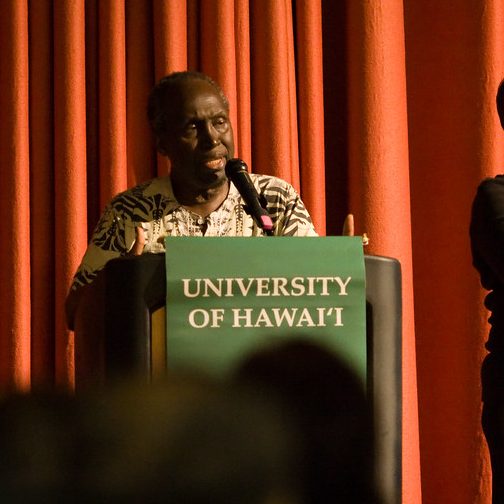The reading habits of Ngugi wa Thiong’o
In the wake of yet another Ngugi wa Thiong’o snub by the Nobel Committee, we are at a loss. Perhaps a reconsideration of the author’s body of work can provide insight.

Image credit Kanaka Rastamon via Flickr CC.
In February 2019, the Kenyan cultural studies scholar Joyce Nyairo moderated a public discussion between celebrated novelist Ngugi wa Thiong’o and his son, Mukoma, also a writer. In a write up of the event, a few days later, Nyairo said the event confirmed something for her: “… what I have always suspected about Ngugi: Outside his own children, he doesn’t read anyone else.” Hers was a suspicion I share. To me the real surprise was that he still reads at all.
Ngugi finished what he considers his magnum opus, Wizard of the Crow on 10 March 2002 as he announces in one of his nonfiction works. Since then he has published in two forms of writing that require the least critical engagement with other writers: memoirs and lecturers. A great memoir or lecture is easier to write than, say, a great novel or play.
In an interview from 2008 Ngugi asserts that “if you ever arrive at the complete truth, you will have nothing else to live for. Except maybe living that truth over and over again.” Could it be then that Ngugi arrived at his truth years ago unwittingly, and has since then been repeating it, trying unsuccessfully to patch up something old and torn?
Ngugi’s advocacy for the Mau Mau liberation movement
One way to interpret what Ngugi told an interviewer in the late 1970s, that he “feels that Kenyan history, either precolonial or colonial has not yet been written,” is that Kenya was doomed to cultural stagnation until Ngugi felt satisfied with the composition of Kenya’s historiography.
On account that his most recursive theme, the Mau Mau liberation movement, ceased to be regarded as terrorists by the state in 2003, hence marking a turning point in Kenya’s historiography. Had Kenya’s foremost author reached his truth, the apex of creative expression, after which an author begins to repeat himself or herself? If the answer is in the affirmative, then Ngugi’s series of memoirs published between 2010 and 2018 can be read as a long sigh of relief, a sign of contentment and even achievement.
But this is not quite how things went. In fact, Ngugi had been repeating himself for decades when the Mau Mau movement ceased to be for the republic of Kenya what Al Qaeda is for America. That is to say, it is possible he reached his truth much earlier than 2002-2003.
Old from the very beginning
Ben Okri, in his introduction to Weep Not, Child published by Penguin books (2002), states that “if Ngugi had published nothing other than Weep Not, Child, he would have earned a distinctive place in the African literary canon.” Responding to the claim, Evan Mwangi asserts that unlike some of his peers, Ngugi’s career took some time to bloom. I agree with Mwangi to a certain extent, but Okri makes a point here related to what I have discussed above. It is this: despite his half a century in letters, Ngugi has really written one book, his first. In the same introduction, Okri writes that “in a sense, all the future Ngugis are embryonic in this novel” which again suggests the numerous repetitions, reviews, and retells in Ngugi’s body of work.
However, while I’m for the idea that Ngugi reached his truth before Wizard of the Crow and the Mau Mau acquittal, I do not think he reached it as early as first published work.
Ngugi reaches his truth
In Weep Not Child, England was for Ngugi the “home of learning” where people go, once they have exhausted learning in Kenya, to study further. But later he changes this view in Writers in Politics referring to his own education in the literatures of the West as an “impoverished diet.”
However, from the Bertolt Brecht quote that marks the end of Decolonizing the Mind to the The Waste Land quote at the beginning of Dreams in a Time of War, Ngugi shows the ornaments of a man who has spent thousands of hours poring over books of Western literature.
And so in referring to them as “impoverished” Ngugi flouts the very books that helped him become the writer he is today, or at the very least he owes them for his writing in the 1960s which is for me the decade he produced his best work in.
I place Ngugi’s culmination of truth roughly between the publications of A Grain of Wheat and The Trial of Dedan Kimathi, with perhaps the earliest display of Ngugi’s ambivalence with books being when he let a peasant who would not read at all to provide the lyrics for the Gatiiro dance in The Trial of Dedan Kimathi, as we read in Simon Gikandi’s book on Ngugi. In this incident, Ngugi downplays not just the importance of literacy in creative composition, but of education as well.
In the early Ngugi, Shakespeare and Achebe “assert their immortality most vigorously” as T.S. Eliot put it. Regardless, Ngugi is still extremely well-read and diversely knowledgeable in a way those that adhere to these assertions without prior interrogation will never be.



















